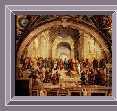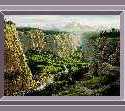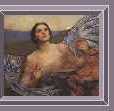Magic, Middle-earth, Merlin, Muggles, and Meaning
A Christian Reading of Spells and the Supernatural
in the Works of J.R.R. Tolkien and C.S. Lewis, and in J. K. Rowling's Harry Potter Books
What is the significance of all this? Presumably it is just as possible to write valid and praiseworthy literature involving a different set of physical and moral laws in a fictionalized version of our own world as in an altogether fictional world? Well, yes. My point is simply that, whatever merits such a work might have, it isn't a work that Tolkien or Lewis ever undertook to write.
Top/Table of Contents
There are complications here that they left well enough alone; potential nettles at which they did not grasp; dangers they did not leave naked and unguarded. In their works they restricted the use of magic to wholly fictional worlds, not because there is any iron-clad literary-moral law to that effect, but because it was a convenient and helpful way to distance the reader in his or her actual circumstances from the fictional circumstances in which magic can be a safe and lawful pursuit.
In fact, in another work, That Hideous Strength, Lewis goes to great lengths to make clear just how dangerous and wrong is attempted magic in our world. He is driven to this of necessity, for in this particular work less clarity almost certainly would have led to misunderstanding. (In fact, in spite of all his efforts, at least one otherwise sympathetic Christian critic, Michael O'Brien in A Landscape With Dragons, did completely and totally miss Lewis' point, accusing him of permissive treatment of occult activity.)
What Lewis does here is to bring back to the twentieth century the sixth-century Druid-Christian Merlin. Merlin's sixth-century "magic," we are given to understand, involved trafficking with a certain class of spiritual beings who were on the earth in those days and were apparently neither angels nor demons but who "pursued their own business." Merlin's activity was at that time not unambiguously condemned, but is now clearly revealed as unlawful. In fact, according to Ransom, the central authority figure in the book, it "was never very lawful," even in Merlin's own day. As with Old-Testament polygamy (my analogy, not Lewis'), Lewis suggests that in this fictional world God for a time tolerated that which was never truly good and has now been revealed to be totally unacceptable. The world, we are told, has changed since Merlin's day; the beings with which Merlin trafficked have either withdrawn from us or else revealed themselves finally not to be so neutral after all. In any case, Merlin may work his earth-magic no more, and Ransom must repeatedly forbid Merlin to attempt or even suggest it.
Beyond this, it is revealed that Merlin's activities, even if not completely unlawful in his day, were still dangerous and harmful, and have in fact taken a terrible toll on him; one character observes that there is "something deadly" about Merlin and his dreadful stillness, like a tree that appears strong but is rotten from within (Lewis' metaphor, not mine). He has lost a kind of metaphysical "virginity" (Lewis' word), and has in the end become a fit instrument for certain terrible works of God that would be inappropriate for a purer vessel (rather like King David, the "man of war," whose martial exploits disqualified him from the sacred task of building the Temple [my analogy]).
Then, if all this were not enough, Ransom even suggests that Merlin's ill-advised involvement with occult forces may have jeopardized his very soul, and that his return in the present day may have been ordained by God as much for his salvation as for his ultimate mission against the evil he is set against. And when Merlin finally does come in power against the Hideous Strength, it is not with his old magic (this is one of the things O'Brien misses), but with power given to him from on high by the great solar oyeresu (angels) of the spheres of the field of Arbol (the planets of the solar system). In effect, he has become a wonder-working prophet like Elijah.
Why did Lewis go to such great lengths to hedge in Merlin's magic with all manner of caveats and warnings and condemnations? Because he wished to avoid any appearance of suggesting that magic, in our world, can ever be regarded as safe or permissible. It's a concern that Christian readers should appreciate; and one not shared by J. K. Rowling.
Again, this does not by itself mean that Christian readers and parents should consign the Harry Potter books to the fireplace. It simply means that that they should be aware that a safeguard which Tolkien and Lewis saw fit to employ is not present here, and that greater care is required with these books than is necessary in the case of the tales of Middle-earth and Narnia. Rowling may not be aware that the imaginary situations she proposes involve the revision of moral as well as physical laws; parents should see to it that their children, at least, know what she does not.
The third hedge, that Tolkien and Lewis relegated the safe and lawful pursuit of magic to characters who are numbered among the supporting cast, not the protagonists, is a traditional element in many types of fairy-story. The wizard or magician tends often to be a supporting character, not a hero. Magic is the pursuit of Merlin, not of Arthur or Lancelot; of Dallben, not of Taran (in Lloyd Alexander's Prydain Chronicles); of Glinda the Good Witch, not of Dorothy.
In stories of this sort it is the hero's journey, not the wizard's, with which the narrative and the reader are primarily concerned. A hero may have a wizard-mentor (or perhaps a magician-sidekick), but the wizard's role is not to initiate the hero (or the reader) into the secrets of his power. Rather, the wizard is seen supporting the hero in his own proper heroic endeavor, with which the reader is primarily to identify. The wizard's magic serves as a supporting plot-device underwriting the heroic endeavor which is the proper focus of the story.
A glaring modern example to the contrary, of course, is the wizard-mentor Obi-Wan Kenobi, who does turn the orphan-hero Luke Skywalker toward the study of the Force. I am a great fan of the Star Wars films, but the fact that that the hero's journey takes the shape of initiation into an esoteric mystery religion does seem to me a point worthy of note and concern.*** Even a supporting witch character, like Willow on Buffy the Vampire Slayer, is, morally speaking, a less serious narrative problem than the three witch protagonists from Charmed.
Tolkien, however, follows the traditional pattern: his Gandalf appears as a typical wizard-mentor whose role is largely confined to guiding the heroes and overcoming certain magical obstacles to allow the true heroes, Bilbo and Frodo, to do their own proper work in their own proper way. Bilbo and Frodo work no magic at all, nor do the vast majority of the supporting cast. (That is because, as Tolkien insists, magic in Middle-earth is the exclusive domain of certain specific beings possessed of inherent magical power; and Hobbits, like Men, are not numbered among these.)
To be sure, both Bilbo and Frodo are bearers of the great Ring whose properties include the ability to render the wearer invisible. However, in the first place, there is a difference between stumbling across or bearing a magic ring, and engaging in the study or pursuit of magical arts; it is significant that neither Bilbo nor Frodo ever takes up sorcery, or learns to cast spells. In the second place, although Bilbo uses the Ring intermittently throughout The Hobbit, from the outset of The Lord of the Rings we are told that the Ring is evil and must be destroyed; that Frodo must bear it but must never use it, for to do so, even once, compromises the user and gives advantage to the enemy. Already we see that it has begun to have a deleterious effect on Bilbo; we learn with horror that Gollum's wretched condition is the Ring's handiwork; and even Frodo is almost consumed by its power. This is very far from the safe and lawful pursuit of magic with which I am here concerned.
Likewise in Lewis' Narnia, although there is good and neutral magic, none of the protagonists (almost invariably children from our world) are depicted engaging in its study or pursuit. In fact, good or neutral magic in Narnia generally subsists more in objects and situations than in characters. A table, a doorway, or a pool of water might exhibit magical properties; but good characters, major or minor, do not go about casting spells. Those who pursue magical arts in the Narnia stories, even among the supporting characters, usually turn out to be villains (the White Witch; the Queen of the Underland; Uncle Andrew).
In fact, in all seven Narnia books there is only one good figure who is a true wizard-type, the magician Coriakin of the Island of the Dufflepuds in The Voyage of the Dawn Treader; an earthbound star who is being punished for unnamed offenses. (Although Lewis gives us no grounds for associating his unknown offense with his magical pursuits, it is interesting that Lewis goes even further than Tolkien in never giving us, in any work, on any world, an unambiguously positive wizard-figure akin to Gandalf.) There is also Doctor Cornelius from Prince Caspian, an ancient, diminutive, corpulent figure who isn't really a wizard, but engages in what he calls "astronomy" but we would call astrology. In fact he is less like a wizard than like one of the Wise Men or Magi in St. Matthew's infancy narrative.
The scene with Coriakin is also noteworthy because the only scene in which any of Lewis' protagonists is seen (rightly) casting a spell: Lucy uses Coriakin's book to make the Dufflepuds visible. Balancing this with a cautionary note, however, Lewis also has Lucy succumb to the temptation to eavesdrop on two of her peers from our world; suggesting, perhaps, that this sort of power isn't for the likes of us. More importantly, this is an isolated event; Lucy does not go on to study magic or become a sorceress.
It may perhaps also be mentioned in passing that Lucy is a privileged figure in the Narnia stories, as Tom Howard demonstrates in his excellent C. S. Lewis: Man of Letters; like Psyche, like Jane Studdock, like Elizabeth, like the Blessed Virgin herself, Lucy has a special receptiveness to the Divine and a special vocation that goes beyond those around her.
But perhaps this last point may be thought to strain the argument to the breaking point. Nevertheless, the larger point is clear from the fact that Lucy does not study magic or become a sorceress. Neither Tolkien or Lewis ever gives us, even in their magical realms, a protagonist who engages in the pursuit of magic; which is of course precisely what J. K. Rowling has given us in Harry Potter.
The fourth hedge is closely related the third: not only do Tolkien and Lewis exclude the lawful pursuit of magic from the main characters with whom we are primarily to identify, they also exclude it from any character with whom we can identify on grounds of humanity.
Tolkien, in particular, was emphatic that Men, like Dwarves and Hobbits, do not have the capacity for magic. The Elves do, as do the Valar and Maiar (angelic beings), of which the Istari (wizards) are a special class, semi-incarnate and subject to physical laws.
Gandalf and Saruman are Istari; Aragorn, who may or may not have worked magic, has Elven ancestry. But magic was never for the human characters of Middle-earth, any more than for the Hobbits who, though not human, are in many particulars much closer akin to Tolkien's own fellow countrymen than are the generically human inhabitants of Middle-earth. As for Narnia, as we have seen, Coriakin is not a man but a star in human form; and even Doctor Cornelius, though not a wizard, turns out to be a Dwarf.
Harry Potter, of course, is quite human, though as the son of a wizard and a witch he belongs to a class of human beings with an innate aptitude for magic, in contradistinction to the non-magical "Muggles." Not only that, he is a boy about the same age as many of his avid readers, who at the beginning of the story has no idea of his exotic parentage, and believes himself to be a perfectly ordinary English boy.
Now, it is of course true that even Coriakin and Gandalf are to all appearances human, as much so as the truly human characters; and it may therefore be argued, not without plausibility, that their "real" I/star/i nature is to a certain extent a technicality that has a limited effect on how the reader relates to them as characters. Yet this brings us to the fifth point: the specific appearance of these characters, and how this affects the way we relate to them.
Gandalf and Coriakin appear to us as white-haired, long-bearded, berobed, staff-wielding old men (even Doctor Cornelius has wizened old features and a long, pointed beard). They appear, that is, as representatives of a well-established class of characters, with a well-established role associated with certain story functions; and we relate to them as such. Everyone knows from the outset that these mysterious, formidable figures are not the reader's peers or role models; nor will we ever get to know them the way we know Frodo and Gimli and Legolas, or Lucy and Caspian and Reepicheep.
Certainly we will be less concerned with the wizards' fortunes and exploits than in how their presence or absence will affect the fortunes and exploits of the other characters. It would not be entirely true to say that they are more plot-devices than characters; but it would not be entirely false either. This is obviously quite different from Harry Potter, who is not only human, but is in nearly every important way the peer of his young readers, a character to whom they can thoroughly identify.
Perhaps the most significant point of contrast has to do with the sixth and final hedge: in Tolkien and Lewis, the narratives give no space to the process by which their wizards acquired their magical prowess. The wizard figure appears as a finished product, with his skills already in place, and there is no narrative interest in the means by which one gains mastery over magical forces. Not only do the stories focus on the heroes' journeys, they omit entirely the sorcerers' apprenticeships.
In Rowling's works, by contrast, it seems that the hero's journey is precisely the sorcerer's apprenticeship. The Harry Potter books, to summarize the above points, are concerned with the story of a hero who is also a wizard in the making; a boy of about the same age as many of his fans; inhabiting what is in many ways the same world they inhabit; with many of the same interests and difficulties that they have; who at one time believed himself to be an ordinary boy like themselves, yet has discovered to his joy and theirs that he is much more; who is now engaged in an education in magic; whose adventures and apprenticeship are the focus of the story arc of the entire series.
And now here are Harry's young readers: children whose own studies are not nearly as interesting than Harry's; perhaps faced, like their hero, with bullying or pestering "Muggle" peers and relatives (if these Muggles are not even Harry Potter fans, so much the better; the young reader really is an initiate and they are not); living under conditions analogous (with respect to magic at least) to the state of Harry himself at the beginning of the first book, before his adventures began.
For such a reader, the almost inevitable fantasy of learning oneself to be one of the adept . . . of having the capacity to learn magic . . . of leaving behind one's mundane studies for an education in sorcery . . . of boldly going where one's Muggle peers cannot hope to follow . . . this is very heady stuff. Such fantasies may be harmless castle-building, or they may become more problematic; but in any case they are very different from the kinds of fantasies that are likely to follow from reading The Lord of the Rings or The Chronicles of Narnia.
To be sure, the young reader of The Hobbit is at first likely to be much taken with the idea of finding a magic ring that renders the wearer invisible; but I have already pointed out how Tolkien defuses that issue. And, if the reader is at all attuned to the real magic of Tolkien's work, his imagination will be much less preoccupied with such things as the wizardry of Gandalf than with, for example, the elusive grace and poetry of the Elves; the earthy austerity and hardiness of the Dwarves; the ineffable stateliness, the sheer antiquity of the Ents; the battle-hardened majesty of Aragorn; the valor and manliness of Faramir and Boromir; and, perhaps, most of all, the Hobbits themselves, with their quiet and humble ways, their unassuming, humorous, gregarious, homebody, pipe-smoking, meal-loving, comfort-seeking, Shire-dwelling hearts, and, hidden just beneath the surface, their unguessed depths and disreputable capacity for heroism.
Even Gandalf himself, if it comes to that, they will probably remember more for his wisdom, insight, and guidance than for any particular spells he devised. The fact is, we like having Gandalf around more because he explains things to us, because he understands what is going on better than anyone else, because he warns us of danger and draws our attention to matters of interest, than because he may turn one thing into another, or foretell some future event.
I do not wish to press this last point too far. Certainly I am very far from suggesting that Gandalf's powers are incidental to his character. Doubtless, when it comes to creating a fire on a cold, wet night, or stripping Saruman the White of his rank, it's handy to have a qualified Wizard around. I would not even say that Gandalf's magic is valuable purely as a means to an end. A Wizard is a character unlike any other, and valuable to the effect of the whole book. Were every fire conventionally built, every villain dealt with by point and edge, the spirit of the epic would suffer. We want magic, and rightly so, not only for what it can do but for what it is.
At the same time, however, it doesn't do, I think, to become too preoccupied with the subject. It's good to have a wizard around, but we shouldn't wish our own fate too closely intertwined with his craft. Though he be on the side of the angels, yet when supping with a wizard, as with the very devil, it's advisable to have a long spoon: and magic itself, while it makes an excellent garnish, is a doubtful main course, and an even more doubtful daily staple. If a particular writer comes closer to making a main course out of magic than other, more prudent authors have done . . . perhaps we will want to consider restricting the former author's writings to something less than a staple in our child's overall literary diet.
I do not say we will necessarily want to eliminate it altogether. The Harry Potter books do have noteworthy merits as literature and entertainment, and perhaps some social and moral ones as well (along with some moral drawbacks). They are well-written, lively, exciting, and quite funny. The villains are utterly odious, and the protagonists are, if not charitable or forbearing, at least brave and loyal. Best of all, there are wise and competent adult authority-figures, especially brilliant and commanding Albus Dumbledore, Headmaster of Hogwarts, who inspires boundless confidence as being always in control of the situation, who virtually never makes a mistake, and whom no one can for long have at a disadvantage. On the other hand, the series takes too long to get around to pointing out the problem of Harry's repeated failures to avert potential disasters by seeking help from Dumbledore.
As for Harry himself, he's a decent enough and likable fellow, with nothing of the bully or troublemaker in him; he's not one to make an enemy -- though if someone makes an enemy of him, Harry will make war on him with every weapon at his disposal. The notion of turning the other cheek or using a soft answer to turn away wrath is completely foreign here; and even the more sober voices, such as that of his friend Hermione (whom Rowling has said of all her characters most resembles herself), generally caution Harry on purely prudential grounds, not moral ones.
Perhaps one of the lowest points, morally speaking, for Harry and for the series, comes in the first book, when Harry anxiously tries to avoid being paired in one of his classes with nerdy, friendless Neville Longbottom. This is a very common and natural reaction, but it is also contemptible, and, while narrative may legitimately depict even heroes doing contemptible things, there ought to be some indication, on the part of the narrative itself if not of the character, that the thing is wrong. As it is, the idea a duty to befriend the friendless is completely absent here. (Neville does eventually become something of a part of Harry's circle, but this doesn't really obviate the above point.) In spite of such shortcomings, however, the books have virtues that commend them to discerning readers. I believe that a healthy, well-balanced reading list for young Christian children could include Harry Potter.
At the same time, however, I think these issues are important ones, and Christian parents should be aware of them. Some guidance for young readers on these points is called for; and certainly a well-balanced reading list should include plenty of other books more in the Lewis/Tolkien mold to make up what is lacking in Rowling's books. In particular I think children should also be exposed to books in which witches and wizards are always evil and attempts to traffic in magical forces always have nasty consequences. (Of course, this by itself is no guarantee that a book is good honey for a child's heart either. Even the Goosebumps books, which may be among the most disturbing in popular children's literature, satisfy this criterion!)
***Editor's Note: This is also a prevalent, nearly exclusive, plot theme in the vast majority of Sword and Sorcery fantasy.
 |
 |
 |
 |
 |
 (c) 26 May, 2000
(c) 26 May, 2000
Updated 13 June, 2000
All Rights Held by the Author.
No part of these pages may be used or copied without express permission of the author.
